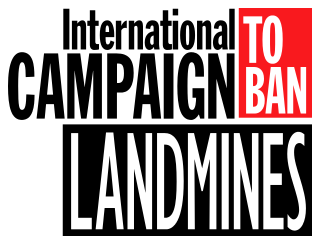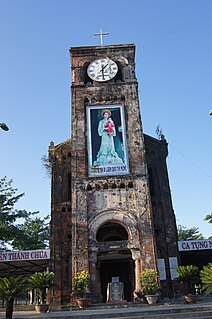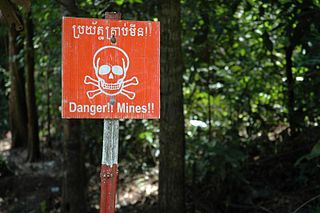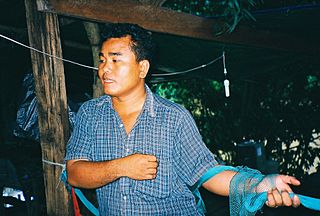
The International Campaign to Ban Landmines (ICBL) is a coalition of non-governmental organizations whose stated objective is a world free of anti-personnel mines and cluster munitions, where mine and cluster munitions survivors see their rights respected and can lead fulfilling lives.

The HALO Trust is a non-political and non-religious registered British charity and American non-profit organization which removes debris left behind by war, in particular land mines. With over 8,000 deminers worldwide, HALO has operations in 28 countries. Its largest operation is in Afghanistan, where the organization continues to operate under the Taliban regime that took power in August 2021.

Unexploded ordnance, unexploded bombs (UXBs), and explosive remnants of war are explosive weapons that did not explode when they were employed and still pose a risk of detonation, sometimes many decades after they were used or discarded. UXO does not always originate from wars; areas such as military training grounds can also hold significant numbers, even after the area has been abandoned. UXO from World War I continue to be a hazard, with poisonous gas filled munitions still a problem. When unwanted munitions are found, they are sometimes destroyed in controlled explosions, but accidental detonation of even very old explosives also occurs, sometimes with fatal results.

Quảng Trị is a province in the North Central Coast region of Vietnam, north of the former imperial capital of Huế.

Demining or mine clearance is the process of removing land mines from an area. In military operations, the object is to rapidly clear a path through a minefield, and this is often done with devices such as mine plows and blast waves. By contrast, the goal of humanitarian demining is to remove all of the landmines to a given depth and make the land safe for human use. Specially trained dogs are also used to narrow down the search and verify that an area is cleared. Mechanical devices such as flails and excavators are sometimes used to clear mines.

Cambodia is a country located in Southeast Asia that has a major problem with landmines, especially in rural areas. This is the legacy of three decades of war which has taken a severe toll on the Cambodians; it has some 40,000 amputees, which is one of the highest rates in the world. The Cambodian Mine Action Centre (CMAC) estimates that there may be as many as four to six million mines and other pieces of unexploded ordnance in Cambodia. Some estimates, however, run as high as ten million mines.
The Fondation Suisse de Déminage is a Swiss non-governmental organisation specialised in humanitarian demining and the clearance of environmental hazards. It was formerly known as the Fédération Suisse de Déminage.
A mine clearance organization, or demining organization, is an organization involved in removal of landmines and unexploded ordnance (UXO) for military, humanitarian, or commercial reasons. Demining includes mine clearance, as well as surveying, mapping and marking of hazardous areas.
The Geneva International Centre for Humanitarian Demining is an international organisation working in mine action and explosive ordnance risk reduction, with a focus on landmines, cluster munitions and ammunition stockpiles. Based in the Maison de la paix in Geneva, it is legally a non-profit foundation in Switzerland.

The region of Nagorno-Karabakh and areas around it are considered to be some of the most heavily mined regions of the former Soviet Union. Mines were laid from early 1990s by both Azerbaijani and Armenian forces during and after the First Nagorno-Karabakh War. The worst-affected areas are along the fortified former contact line between Azerbaijani and Armenian forces, in particular in the districts of Aghdam, Fuzuli and Jabrayil. According to military experts from both Azerbaijan and Armenia, the ground in those areas is covered with "carpets of land mines."

Aki Ra is a former Khmer Rouge conscripted child soldier who works as a deminer and museum curator in Siem Reap, Cambodia. He has devoted his life to removing landmines in Cambodia and to caring for young landmine victims. Aki Ra states that since 1992 he has personally removed and destroyed as many as 50,000 landmines, and is the founder of the Cambodian Landmine Museum.
Land mines in Central America are a by-product of the Cold War-era conflicts of the 1980s. Contrary to the requirements of generally accepted international law, the minefields of Central America were usually unmarked and unrecorded on maps. Once placed, mines remain active for years, waiting the pressure of an unwary foot to detonate.
Mine action is a combination of humanitarian aid and development studies that aims to remove landmines and reduce the social, economic and environmental impact of them and the explosive remnants of war (ERW).

The Mines Advisory Group (MAG) is a non-governmental organization that assists people affected by landmines, unexploded ordnance, and small arms and light weapons.

The United Nations Mine Action Service (UNMAS) is a service located within the United Nations Department of Peacekeeping Operations that specializes in coordinating and implementing activities to limit the threat posed by mines, explosive remnants of war and improvised explosive devices.

Danish Demining Group (DDG) is the Human Security Unit under the Danish Refugee Council (DRC), specialised in clearing landmines and unexploded ordnance and reducing armed violence.

The Center for International Stabilization and Recovery (CISR), formerly the Mine Action Information Center (MAIC), is a public policy center at James Madison University that manages information, conducts training, holds conferences and workshops, and performs research relevant to humanitarian mine clearance, victim assistance, mine risk reduction and other explosive remnants of war (ERW).
Gender mainstreaming in mine action is the application of gender mainstreaming to mine action. It is increasingly being adopted by international and state mine action organizations.
Legacies of War, is a fiscally sponsored project of NEO Philanthropy, Inc (NEO), dedicated to raising awareness about the history of the Vietnam War-era bombing in Laos and advocate for the clearance of unexploded bombs, (UXO) and survivor assistance, to provide space for healing the wounds of war, and to create greater hope for a future of peace.

ITF Enhancing Human Security is a humanitarian, non-profit organization founded by the Republic of Slovenia., which specializes in land mine clearance and post-conflict reconstruction. It was established on 12 March 1998 with the purpose of helping Bosnia and Herzegovina in its post-conflict rehabilitation, specifically with mine clearance and assistance to mine victims.












